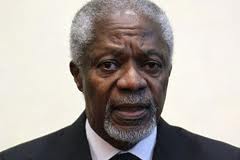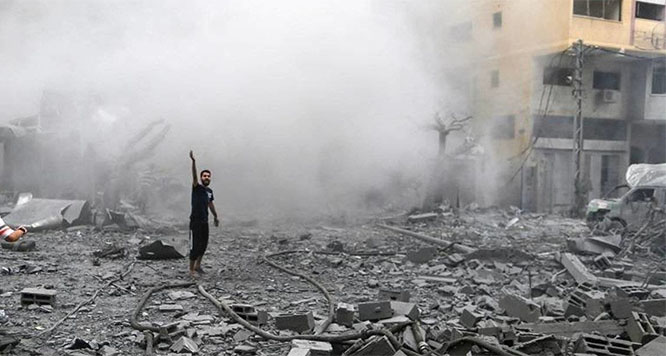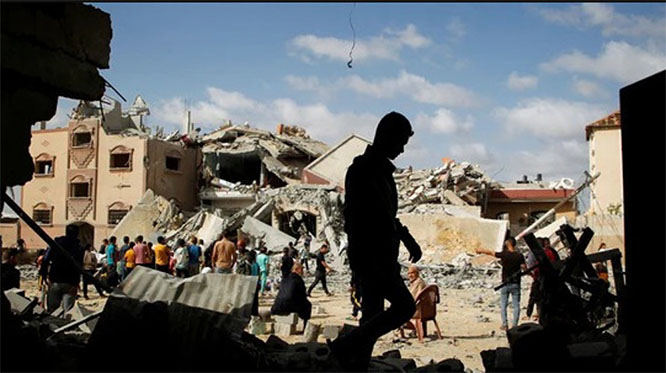
United Nations, April 3: Syria told international envoy Kofi Annan that its military will withdraw troops and heavy weapons from populated areas by April 10, in what could be a first step toward ending the bloody yearlong conflict, UN diplomats said Monday.
The announcement came as Syrian troops hunted down activists and destroyed their homes in the country’s rebellious areas, and the United States remained skeptical of Damascus’ latest statements, pointing to previous broken promises. Britain, France, Germany and a number of other countries also questioned whether Syrian President Bashar Assad would keep his word, the diplomats said.
“We have seen commitments to end the violence followed by massive intensifications of violence,” US Ambassador Susan Rice said. “So the United States, for one, would look at these commitments and say, yet again, the proof is the actions, not in the words.”
Rice said Annan told the UN Security Council he received a letter from Syria’s foreign minister on Sunday with the April 10 date and indicated he would have preferred the pullback to begin earlier. Annan urged the Syrian government to start the withdrawal immediately and move no further into populated areas, and “that commitment was provided,” Rice added.
“Past experience would lead us to be skeptical and to worry that over the next several days rather than a diminution of the violence, we might, yet again, see an escalation of the violence,” said Rice, the current council president. “We certainly hope that is not so. We hope the Syrian authorities will implement the commitments they made without condition or codicils.”
Syria’s UN Ambassador Bashar Ja’afari said the April 10 deadline was set “by common accord” between Annan and the Syrian government, and he again pledged his government’s complete support for Annan’s six-point plan to end the yearlong Syrian crisis.
Annan told the council if Syria meets the April 10 deadline, and this can be verified, then the opposition would have 48 hours to wind down its military activities so there would be a complete cessation of hostilities, the diplomats said, speaking on condition of anonymity because his briefing was closed.
Annan’s plan to end Syria’s crisis calls for an immediate withdrawal of troops and heavy military equipment from populated areas, followed by an overall cease-fire — first by government forces and then by opposition fighters — to pave the way for talks by all Syrian parties on a political solution. It includes an immediate daily two-hour halt to fighting so humanitarian aid can reach suffering civilians, and unhindered access for humanitarian groups and the media.
Rice stressed that the Syrian agreement was just on the pullout of troops and equipment from cities and towns. She said Annan, who briefed a closed council meeting by videoconference from Geneva, is expecting details from the Syrian government “very shortly” on the other aspects of the plan.
Annan is sending a UN peacekeeping team and some staff to Damascus this week to continue preparations for a potential UN cease-fire monitoring mission. The joint UN-Arab League envoy also was considering borrowing troops from UN operations in the Mideast, Rice said.
Rice said Annan asked the Security Council to support the April 10 deadline and start urgently considering a potential UN monitoring mission, which would need council authorization. Rice said the Council expressed its full support.
One of the key issues is trying to unite the many different opposition factions under a single umbrella.
Rice said Annan’s deputy, Nasser Al-Kidwa, has had “constructive exchanges with the opposition to urge them to cease their operations within 48 hours of a complete cessation of government hostilities.” Al-Kidwa attended a meeting of Syrian opposition groups in Istanbul last week.
Assad accepted Annan’s plan a week ago, but late Friday the Syrian government rejected Annan’s call for the regime to halt violence first.
Annan had appealed for the Syrian authorities to stop military operations first as “the stronger party” in a “gesture of good faith” to the lightly armed opposition.
But Foreign Ministry spokesman Jihad Makdessi said Friday the government will not pull tanks and troops from towns and cities engulfed by unrest before life returns to normal there.
That position may have changed, but Syria’s Ja’afari said his government expects Annan to get similar commitments from the opposition.
“So far, the Syrian government says that it is committed and we are expecting Mr. Kofi Annan ... to get in touch with the other parties — those who are involved with initiating, sponsoring and arming the armed groups also — in order to make the stopping of the violence relevant to all parties,” he said.
Key opposition figures joined representatives from more than 70 countries, including US Secretary of State Hillary Clinton, at Sunday’s “Friends of the Syrian People” conference in Istanbul. The “Friends” pledged to send millions of dollars and communications equipment to Syria’s opposition groups, pushed for tighter sanctions and diplomatic pressure to further isolate Assad, and urged the opposition to offer a democratic alternative to his regime.
Syria’s Ja’afari lashed out at the meeting and its supporters.
“The so-called Conference of the Enemy of Syria in Istanbul is itself a violation and contradiction of Mr. Kofi Annan’s mission,” he said. “This is a parallel track set up by the enemies of Syria to compete with Mr. Kofi Annan’s mission, not only maybe to compete, maybe to undermine his mission as a whole.”
Ja’afari said those who want to send money to armed opposition groups or pay their salaries are committing “a violation and declaration of war against the sovereignty of Syria.”
Earlier Monday, Russia raised pressure on an old ally, with Foreign Minister Sergey Lavrov saying Syria’s government must take the first step toward settling the country’s conflict by pulling troops from city streets.
Lavrov’s statement at a briefing in Yerevan following talks with his Armenian counterpart appeared to reflect Moscow’s increasing impatience with Assad.
Russia, along with China, has twice shielded President Assad from United Nations sanctions over his crackdown on an uprising in which more than 9,000 people have been killed, according to the United Nations. But Moscow also has strongly supported Annan’s six-point plan.
Lavrov also warned the West against giving ultimatums to Damascus, saying that the priority now should be to separate the warring parties and open the way for the delivery of humanitarian aid.
“Ultimatums and artificial deadlines rarely help,” he said. “We all want a quick end to bloodshed, but that demand should be addressed to all warring parties in Syria.”
In Geneva Monday, the president of the Red Cross said he had returned to Syria for a two-day visit aimed at convincing the country’s leaders to give more access to aid workers.
Jakob Kellenberger said in a statement that he also will raise “the issue of access to all places of detention” and how to stop the fighting for two hours a day. He said a daily pause is essential to evacuate the wounded and deliver aid.
Lavrov said Russia didn’t attend Sunday’s meeting of the “Friends of the Syrian People” because its organizers had failed to invite Syrian government representatives.
“I think such an approach is dangerous and contradicts Kofi Annan’s efforts,” he said. “We are trying to be friends of all the Syrians, and not just some part of the Syrian people.”
He said that Moscow will soon host two separate opposition delegations for talks.








Comments
Add new comment